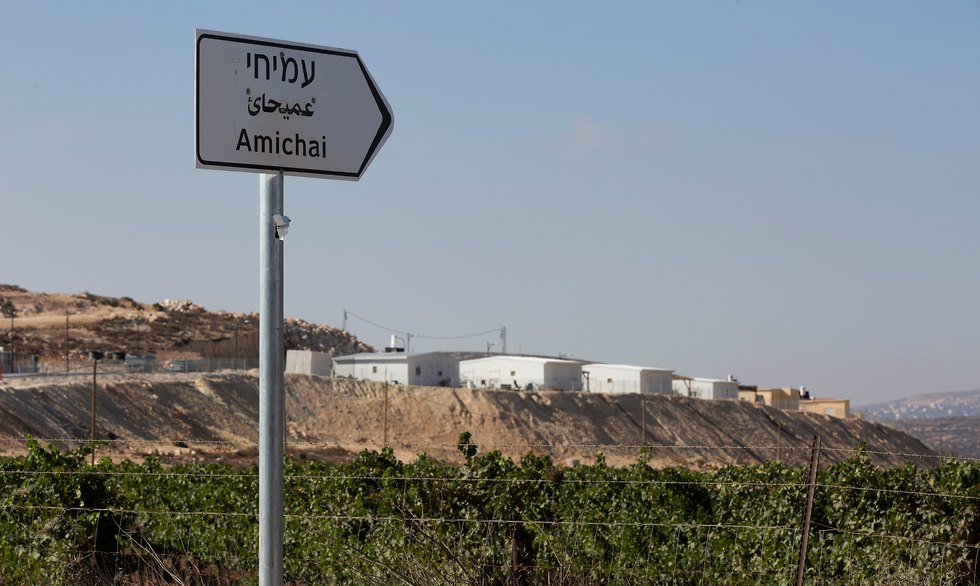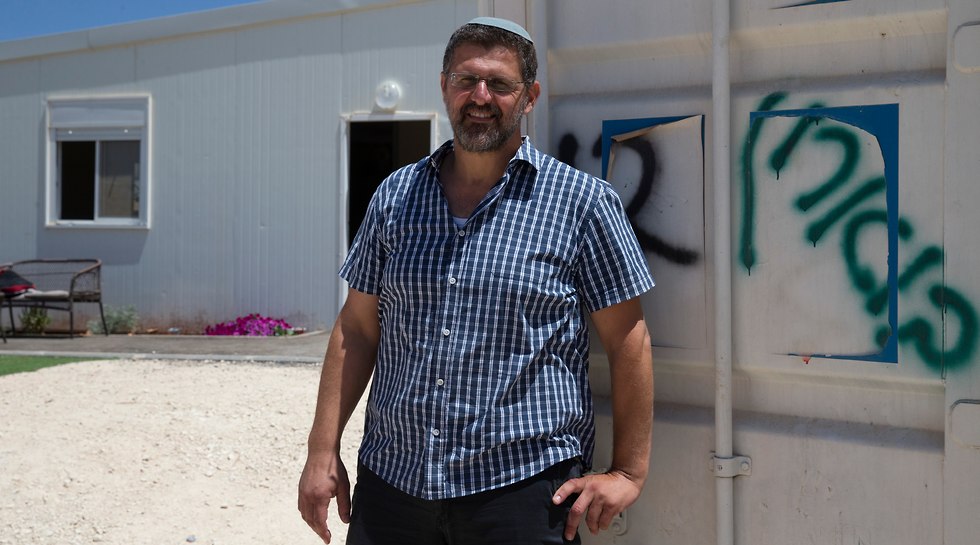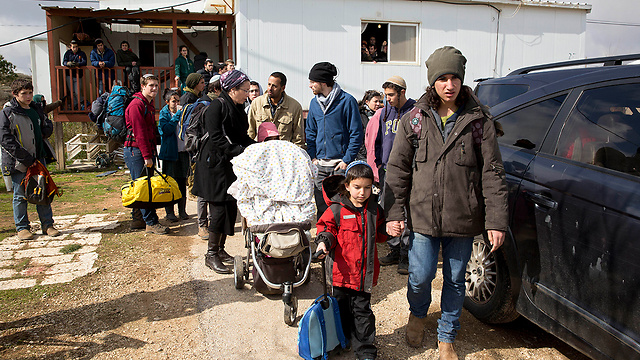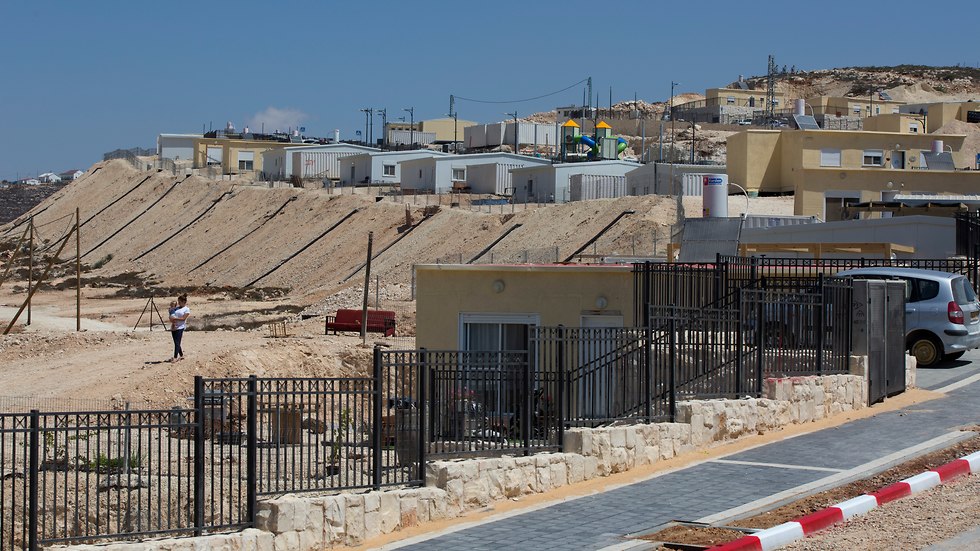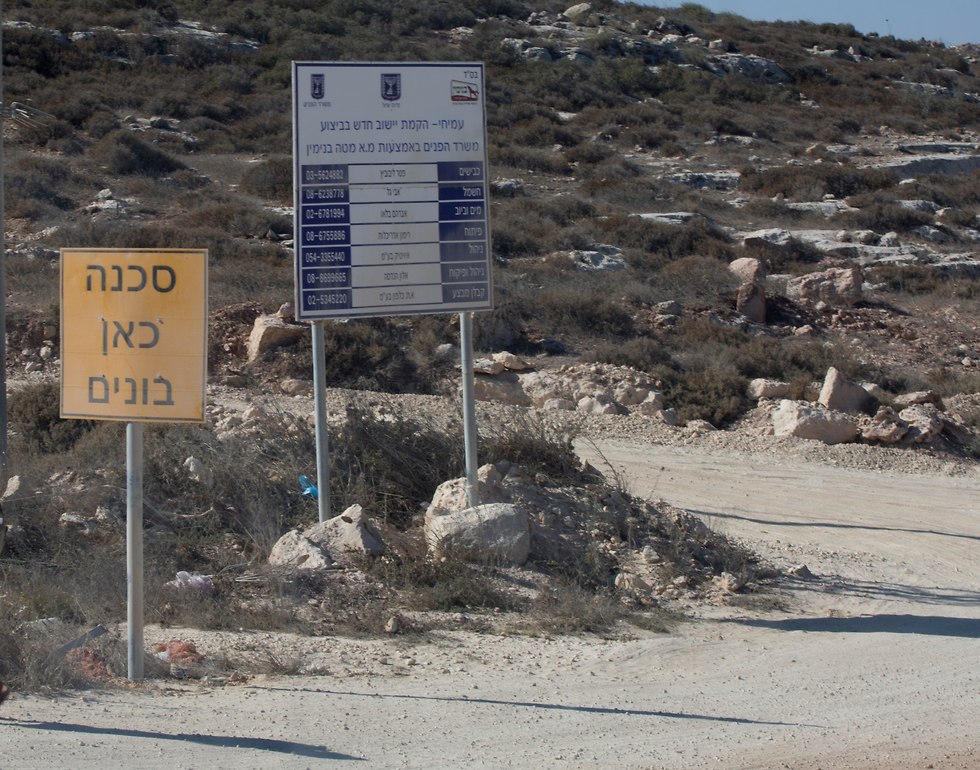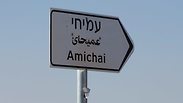

Oslo is dead, Amichai is alive
25 years after the Oslo Accords, the new settlement Amichai, being built for families evacuated from the illegal outpost Amona, and the nearby outposts that will be annexed to it and legalized, are helping create a Jewish corridor breaking up Palestinian territory in the West Bank and burying the agreements.
At the heart of this fertile valley a sign stands out at the entrance to the gravel road leading to Amichai, the new settlement being built in the valley. In dry language, the sign announces the construction taking place there. It is signed by the State of Israel, the Interior Ministry and the Binyamin Regional Council—a stamp of legitimization and legality for this settlement.
It's been 25 years since the signing of the Oslo Accords, which were supposed to lead to the division of the territory, a massive evacuation of settlements, the establishment of a Palestinian state and a final-status agreement. Instead, Israel is further strengthening its hold on the West Bank.
The settlement of Amichai, the first to be built under a government decision since the Oslo Accords were signed, is expected to annex the neighboring outposts, starting with Adei Ad. The meaning of such a move is twofold: Primarily, it would legalize these outposts. Secondly, it will also create a territorial barrier of Jewish settlement in the heart of the West Bank, which breaks up the Palestinian territorial contiguity.
When looking from one of the hills dominating the valley at the nearby Palestinian villages—Turmus Ayya, Mughayir, Jalud and Krayot—it is clear how much the Oslo Accords are no longer relevant. The settlement enterprise has expanded, and it is no longer just the actions of thieves in the night who sneak onto hills to stake their claim, but an established undertaking with the state's seal of approval, done with the clear objective of thwarting any possibility of a two-state solution.
Shabtay Bendet, the head of Peace Now's settlement watch, looks at the maps that show the new settlement Amichai, and asks us to go visit Nofei Nekhemia, an illegal outpost east of Ariel.
"If you stand at the entrance there and look east, you'll see settlements and outposts on every hill all the way to the Alon Road that's over the valley. A Jewish settlement bloc developed there, which is spread over a gigantic geographical area," Bendet says. "This means the settlers have started creating a contiguity of settlement, setting facts on the ground."
"The Shiloh bloc is supposed to be Palestinian territory in any future final-status agreement, but now the Israeli government is building a settlement there and plans to annex illegal outposts to it, to launder them," he accuses. "These are places the state itself has determined to be illegal, that the Civil Administration—a branch of the government—issued demolition orders against. And they're going to be legalized."
The goal: 1,100 homes
The settlement of Amichai was born of the evacuation of Amona. The illegal outpost near Ofra was evacuated in February 2017. Forty families were living there when it was evacuated, most of them moved to a youth hostel in Ofra. The political and public campaign the residents mounted led the Security Cabinet to decide to approve the construction of a new settlement for the outpost's evacuees.
For the settlers, this is a historic achievement: Since the signing of the Oslo Accords in September 1993, the Israeli government has avoided the construction of new settlements in the West Bank, at least not in an organized manner under a government decision. The policy of all Israeli governments since the Accords were signed was not to build new settlements to not annoy the Americans and the Europeans, so they won't be able to accuse Israel of sabotaging the possibility of a future agreement with the Palestinians.
Now we're in Avichai Buaron's mobile home, which is located on the lot allocated to his family in the new settlement. Four months ago, the contractor employed by the state finished preparing 60 lots for construction, the mobile homes were placed on these lots and the Amona evacuees moved in. The infrastructure work done so far includes connecting the new settlement to the water, electricity and sewage systems, paving roads and sidewalks, installing street lights and building two kindergartens and a play park.
In addition to the 60 lots that are ready, a plan has already been approved to build infrastructure for 42 additional lots.
This is the short-term plan. In the long term, Amichai, based on the approved construction plans, would have 1,100 homes. It wouldn't be just another small settlement, but a proper town.
The gravel road ends after about 100 meters and becomes a new paved road. Buaron, who was the head of the Amona residents' struggle, opens up a big shipping container he got from the Defense Ministry to store the furniture from his old demolished house. Thirty-six families from Amona have already moved in to Amichai, each with one or two such containers on their lots.
The residents now need to work on the plans for their homes—each family with its own architect—submit a request to the regional council for a building permit, and hire a contractor.
"Even before we moved in, we had families approach us asking to join the new community," Buaron says. "We have a list of 70 families who want to build their homes here. The demand is immense, look at this view."
We sit at the mobile home's back yard, with the homes of Adei Ad behind us on a faraway hill and a bright green area of grapevines to our right that belong to the Ahiya outpost.
"We fought for our homes in Amona," Buaron says. "We wanted to stay there, and after the evacuation we waged a campaign to build a legal community. We didn't want to start building again with half a wink, a pat on the back, and the promise everything will be okay."
"The agreement with the prime minister is that a community will be built for us at a place we would choose in the Binyamin Regional Council, in coordination with the Prime Minister's Office," he explains.
"One option was at a military base east of the Alon Road, not far from Rimonim. Another option was in the Neve Tzuf (Halamish) area. And this, here, was the third option. We chose this place because legally it was the one most likely to get the permits for the construction of the new community. It wasn't an ideological choice of location. The ideology was limited to our desire to build a new community in Judea and Samaria, a legal one, as a private idealistic and national statement," Buaron goes on to say.
"We wanted to leave the youth hostel as soon as possible. We were living in 15-square-meter rooms. A family of six children or more got two rooms. People were crowded into small rooms as they carried with them scars, like wounded returning from the battlefield. Broken physically and mentally. We realized that here was our quickest option to start our lives anew," he continues.
But the historic significance was also clear. "This is insanely significant. It's a statement to the world that we, the people of Israel, are building a new community here in the heart of Judea and Samaria out of a national view that says 'We're here forever,'" he exclaims.
Buaron claims the very decision to establish Amichai symbolizes a change in direction for Prime Minister Netanyahu.
"Some three years before the evacuation of Amona, a group of us residents were sitting in the office of the Defense Ministry's legal advisor, Ahaz Ben Ari, in the Kirya IDF base in Tel Aviv. To our west was the Mediterranean Sea, to our east were the mountains of Judea and Samaria. Ben-Ari looked east and said, 'You do realize you're living there temporarily, right?' We asked him what did he mean—'you're talking about our homes, our lives.' He answered, 'The international community won't let us stay there forever.' I told him someone greater than us (Israel's first prime minister David Ben-Gurion) once said, 'What matters is not what the goyim say, but what the Jews do.' And we said goodbye," he recalls.
"This is the common view among the Israeli bureaucrats who decide and run things. This is the view that uses life in Judea and Samaria as a bargaining chip on the way to an arrangement with the Palestinians. Life in Judea and Samaria is put on hold. That is why the construction is only down within the confines of the separation barrier," he explains.
"So the establishment of Amichai is an internal statement to the bureaucrats as well as one to the international community that we're done with just maintenance, and we're moving forward by building a new community in the heart of the land. And not just a new community is being built, but this community is legalizing all of the smaller communities in the area. We're leaving the confines of the separation barrier and building a community that completes the corridor of Jewish settlement from the beach in Tel Aviv to the Jordan Rift Valley. It nullifies the possibility of establishing an Arab state at the back of the mountain. And this isn't my own personal statement, but a statement made by the prime minister and the entire Israeli government that voted unanimously to establish Amichai, a statement by the State of Israel," Buaron declares.
Following the road to dispossession
At noontime, we left Amichai on the gravel road and turned right on the road crossing the Shiloh Valley. We drove past the olive grove and the grapevines and turned left towards the outposts Kida and Esh Kodesh. The road then continues to an electric iron gate, which opens the road down to the Alon Road that borders the Jordan Rift Valley to the west. Even before the iron gate, we made a right turn toward the hill that houses Adei Ad. A wooden sign at the entrance declares: "Trust G-d—Adei Ad."
Yesh Din, a legal NGO, published a report four years ago titled "The Road to Dispossession," which deals with the events that led to Adei Ad's establishment and the outpost residents' clashes with the Palestinians who live nearby.
Ziv Stahl, Yesh Din's head of research and the author of the report, tells us about the petition the organization filed to the High Court of Justice in 2014 against the state for its handling of Adei Ad.
"The main argument in the petition was that 26 percent of the outpost was on private land belonging to Palestinians and that it serves as a flashpoint for violence and lawlessness. Over the years, the state moved six structures in the outpost to state-owned land. It also informed the court it'll work to legalize the outpost, but it was unclear how it was going to do it. In January, the High Court gave the state nine months to legalize the outpost, meaning until September of this year. Then, in August, the Civil Administration informed the High Court there is a plan to expand Amichai's jurisdiction to include Adei Ad," she says.
How symbolic. Adei Ad was established in the spring of 1998 in response to the Wye River Memorandum, which was part of the Oslo Accords. The memorandum dealt with transferring lands to the Palestinians from Area C to B, and from B to A. In total, 10 percent of the West Bank's land was moved to full Palestinian control under the memorandum. It was signed by the prime minister at the time, Benjamin Netanyahu.
Adei Ad wasn't a gut reaction of the settlers. The settlers who made their home on the hill, 845 meters above sea level with panoramic views of the Jordan Rift Valley and the Shiloh Valley, focused on farming. Some of the plots they started to farm were owned by Palestinians.
Over the years, there were hundreds of clashes between the settlers and their Arab neighbors. Stahl says the clashes and the reduction of the farmland for the Palestinian residents caused a negative migration in the neighboring villages.
"There's a departure of residents from the nearby villages to the Shiloh Valley," she says. "Mostly young people, for the simple reason there is no economic feasibility. The outposts suffocated the villages."
It happened when the Oslo Accords were still on the table and the Palestinians had hope of gaining independence. Buaron and his friends in the Jewish settlement leadership know this history well.
"Oslo was a disaster," Buaron says before we part ways. "It caused great damage and claimed over 1,000 Israeli victims. It's good that this agreement is dead, gone from this world. The current government is working to reduce the Palestinians' hope of a state as much as possible. The statement 'There won't be a Palestinian state' is being implemented on the ground. And the proof of that is Amichai, whose establishment makes it clear to the Palestinians that not only will the Jewish settlement not be evacuated, the opposite is happening, it's being expanded."














